Tuscaloosa was not united
(Partial transcription of a history of Tuscaloosa written by an older resident, Ben A. Green, in 1931 who was the managing editor of The Tuscaloosa News July 31, 1949, about early Tuscaloosa)
Rumblings of the Civil War were quite apparent in 1860 and Tuscaloosa with much-divided sentiment and forebodings cast anxious eyes at Montgomery. Tuscaloosa County’s two legislators voted against secession and the city-s own mayor, Robert Blair in his second period of chairmanship was a Republican, which was regarded as equivalent to a Union sympathizer. Blair contended he voted Republican only once but he was looked upon with suspicion by the Democrats. He was a strong man and a leader, however, and actively guided Tuscaloosa in her efforts to aid the Confederacy early in the war. ……..
Years have mellowed the hearts that flamed high with the passion of conflict in the Civil War, and the haze of history has created for many the idea that a United South fought a united North and the North won. The name of ???tory is not disputed but the facts of that age show that the South was far from a united section and the North also encountered much interior resistance.
Many citizens opposed secession and war
In 1861 there was not even a united Tuscaloosa, as far as proslavery sentiment for the Confederacy was concerned. Many citizens opposed secession and war. The loyalty of Tuscaloosa city and county was never doubted, however. More than 3,900 Confederate soldiers enlisted from this county, a total almost twice the entire city population at that time. But many of them fought just because the majority willed it. They adhered to the Democratic Jeffersonian doctrine of majority rule, even if it meant their life blood.
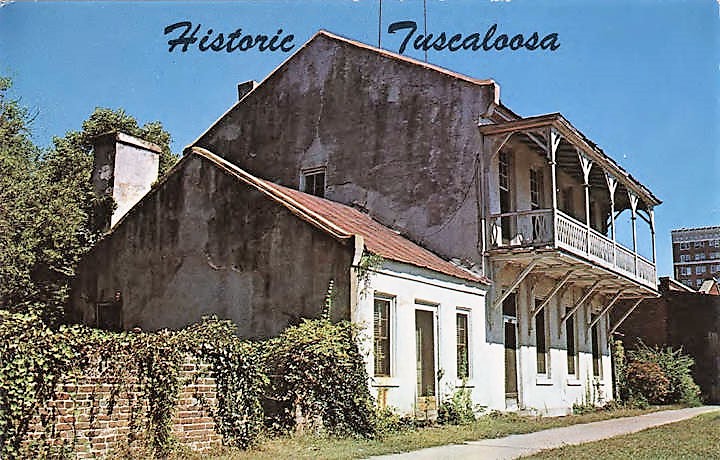 Historic old Tavern in Tuscaloosa 1960(ADAH)
Historic old Tavern in Tuscaloosa 1960(ADAH)
Sentiment against the war was so pronounced that for a time some Union sympathizers attempted to form a federal state including that portion of territory north of Tuscaloosa and extending to the outskirts of Chattanooga. Tuscaloosa was on the very edge of this pro-Union section which Unionists wished to found as the State of Nickajack named for the famous Nickajack Cave near Chattanooga.
Civil War a jealous and economic one
Their efforts failed, chiefly because of resistance made by wealthy Black Belt planters who had millions invested in slaves. The Nickajack territory had neither cotton nor slaves, therefore had no use for the negroes and were jealous of the wealth and power given the Black Belters by slave ownership. It was another proof of the fact that the Civil War issue was primarily a jealous and economic one rather than the great moral question emphasized in “Uncle Tom’s Cabin.”
Tuscaloosa’s city government shifted from Democratic to Republican rule five years before the invasion of Croxton’s Raiders and the influx of carpetbaggers who followed the musketry. In fact, Tuscaloosa had Obediah Berry, a Republican, as mayor when Croxton arrived with his troops in 1865, Mayor Robert Lacey, a Republican, succeeded Rober Blair, a fellow party man, in 1862 but left town before his term expired. Records fail to show the reason for his departure.
Jesse C. Adams, a Democrat, succeeded Lacey but resigned July 17, 1863, and John Glascock, another Democrat served as mayor pro tem. His rule was very brief, however, and Obadiah Berry took his place as the third mayor to serve in 1863.
Check out all the books on Alabama Pioneers…
 ALABAMA FOOTPRINTS Pioneers: A Collection of Lost & Forgotten Stories includes the following stories
ALABAMA FOOTPRINTS Pioneers: A Collection of Lost & Forgotten Stories includes the following stories
- The Yazoo land fraud
- Daily life as an Alabama pioneer
- The capture and arrest of Vice-president Aaron Burr
- The early life of William Barrett Travis, hero of the Alamo
- Description of Native Americans of early Alabama including the visit by Tecumseh
- Treaties and building the first roads in Alabama


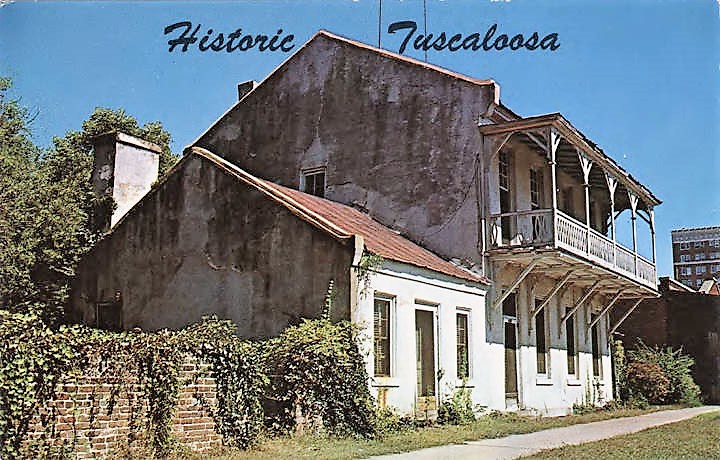
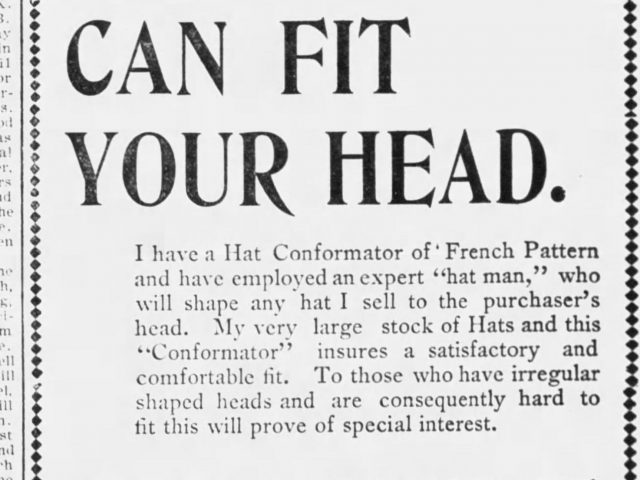
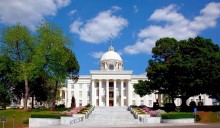
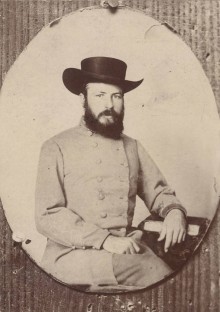
While it is true that the Civil War was fought over States Rights and slavery, the states rights issues seem to have been over slavery and tariffs. Around 80% of Southerners didn’t own slaves and tariffs were on imports. Again, around 80% COULDN’T Afford Imports!
slavery was ONLY one(1) issue. The war was fought totally over Secession of Rights! The South was not going to allow any “Damn Yankee” tell us how to live our lives, and they wanted to push slavey as a devout issue, when the North was guilty of owning slaves themselves??? Duh, go figure huh???
Regardless of who owned and when, slavery was/is immoral and wrong. Romanticizing and glorifying what brought about the war WILL NEVER justify slavery and its illegitimate child jim crow.
Much is made by liberal revisionists about the fact that a large minority in Alabama opposed secession.
Fact is though saying that is VERY misleading and disingenuous.
Candidates that ran as delegates to the secession convention were of three factions: secessionists, conditional secessionists, and unionists. Conditional secessionists were NOT AGAINST SECESSION. They were opposed to unilateral secession by Alabama WITHOUT coordination with other States.
The first vote of “the people in convention” (BTW the same way the Declaration and the Constitution were implemented) was 55 to 45 for IMMEDIATE AND UNILATERAL SECESSION of Alabama. The vast majority of those voting no on that first ballot however were conditional secessionists. This fact is born out by the 2nd vote of the convention, 95 to 5 FOR SECESSION. Thus only 5 out of 100 were unionists! This final vote is
indicative of the sentiment of the entire electorate at the time too. Those delegates were freely elected and had to state their preferences BEFORE the convention.
Rarely if ever has a democratic State took such drastic action as secession and risked so much with more unanimity than Alabama and the rest of the South did in 1860 (whether modern day politically correct folks like it or not)
Now those PC want us to believe that secession was all about rich people hanging on to their human property?
Give me a break.
Thank you Sir for a educated post on succession …I’m not a historian by any measure ,, but I do believe that the tariffs passed from the 1820’s to 1860 heavily favored the industrial north and punished the agricultural south , referring to the PASS THROUGH EFFECT of all import taxes on a export based economy …In 1860 ,, 60 to 75 % of southern goods went overseas ,, and also in 1860 , up to 95% of Federal revenue was generated by import tarrif’s ….And to see the influence of the northern industrialists Mr Morrill and Mr Stevens grew their personal fortunes by pushing tarrif’s to favor one region of America and handicap another is shameful ..
I had g-g grandfathers, a g-g-g grandfather, and other relatives that fought for the Connfederacy. They were from Jefferson, Blount, and northeastern areas of Alabama. None were slave owners or planters. They were subsistence farmers, doing what they could to make ends meet. They volunteered their service to the Confederacy. How I have wished I could sit down with them and discuss their views on secession. I’m sure it little to do, if anything, with slavery. I believe my ancestors fought, were wounded, and died for a cause that went beyond slavery. These were men of southern Appalachia who led a hard scrabble life.
A lot of it had to do with who would control congress with western states coming into the union as either free or slave states. When the slave states began to outnumber the free states the northern free states wanted war. Most people in the south never owned a slave so it could not have been so much about that. I am not trying to support slavery in any form but it is sad that true history has not been taught in many years. I actually still own a book where Lincoln is quoted as saying that if keeping slavery would save the union he would keep it.
Taylor Giddiens
Is this place for sale
An still not democrats run Tuscaloosa
Gay Torbert Oswalt
Taylor Giddiens
I believe the West Point of the Confederacy was located in Tuscaloosa … I always look for History Markers when I’m around the campus but I’ve never seen any.